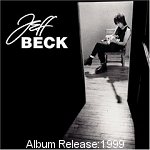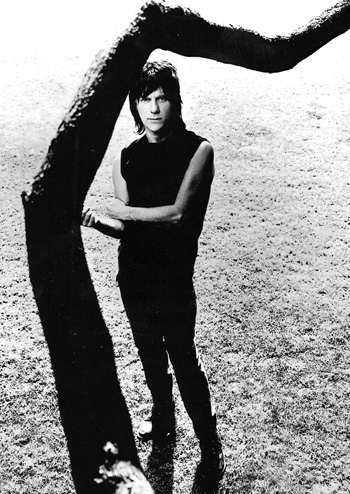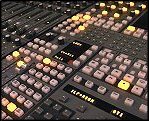Jeff
Beck is a name synonymous with the electric guitar.

With
YOU HAD IT COMING. Beck's latest album during
his three-and-a-half decades as an Epic recording artist,
his name becomes tantamount to innovation, as the guitarist
continues to experiment with modern, cutting-edge music.
YOU HAD IT COMING finds the legendary British
musician further enthralled by the nature of sound.
"It's almost a chosen path for me by someone else,
because I was never a singer," Beck says of his
songwriting. "Without a vocal, you've got to concentrate
on what people hear. Sound is everything."
The predominantly instrumental album is bounded by a
collage of drum loops and digital-age wizardry, all
at the service of Beck's signature guitar playing.
"I view technology as a friend - there's no use
messing around with enemies," he says. "I
first ran across some electronic music 30 years ago,
and I assumed it would be coming along much sooner than
it did. I thought, 'If only you coufd get that sound
on a guitar.'"
 |
|
Who
Else!
|
The outcome of his prolonged interest is YOU
HAD IT COMING, a project that combines the
tones and technology of the new millennium with
the skill and credibility of experienced hands.
After releasing last year's Grammy-nominated
Who Else!, Beck's first album of original
music in a decade, the musician spent much of
1999 on tour with his newly assembled band.
This was quite an about face for the celebrated
guitarist, who hadn't been particularly prolific
during the previous two decades, instead consuming
time through his other passion of tinkering
with vintage cars. But a subtle revelation paved
the route for back-to-back recordings.
|
|
|
|
You
Had It Coming
Record Label: Epic
Originally released: Feb.
6, 2001
|
|
|
|
"It was trying to come to terms with the fact that!
didn't want to stop playing," he admits. "The
thing looking me in the face was, 'If you don't play
Jeff, you're not going to play.' After 120-odd gigs,
including people's back gardens in Italy, I didn't want
to go all through that for nothing - to lose track of
the band and go into recession again."
Quite the opposite happened, with Beck holing up in
London's Metropolis Recording Studio with his band (guitarist
Jennifer Batten, bassist Randy Hope-Taylor and drummer
Steve Alexander), programmer Aiden Love and producer
Andy Wright. ("Andy, we call him 'the trawler,"Beck
quips. "Because everything I play he trawls through,
like a fishing boat, to get all the good bits.")
The collaboration resulted in a record that joins the
distinguished pantheon of his prior milestones: Truth,
Blow By Blow and Wired - still among the best selling
guitar albums of all time.
Opening YOU HAD IT COMING is "Earthquake,"
a tune emblematic of Beck's new approach, fueled by
a hammering distorted riff that alternates time signatures
between 6/4 and 5/4. The tumultuous tune is so named
because "an earthquake represents the opening up
of a new world, whilst giving the old one a good shaking."
Beck returns to his roots with "Rollin1
and Tumblin1," a swampy blues gem that has inspired
previous interpretations by Muddy Waters, Cream and
Canned Heat. "Rollin1 and Tumblin1 is something
which has been lurking in my cupboard for 25 years,"
Beck says. "I've wanted to do a hot-rod version
of that, but the drummers were never right and the singers
weren't there." Beck found his ideal vocalist in
Imogen Heap, a young Londoner whose scorching take on
the tune was recorded in one pass.
Perhaps the quirkiest cut is "Blackbird,"
which finds the ex-Yardbird collaborating with an  unnamed feathered friend. "Round about spring,
a blackbird sings loudly up on my roof," he says.
"Although I didn't record that bird, I got a tape
of a blackbird and started jamming with him. If you
listen, the notes the bird is singing are almost beyond
human hearing, but the actual punctuation and tonal
things are there. I aped the bird as close as I could,
and we all had a good laugh with that one."
unnamed feathered friend. "Round about spring,
a blackbird sings loudly up on my roof," he says.
"Although I didn't record that bird, I got a tape
of a blackbird and started jamming with him. If you
listen, the notes the bird is singing are almost beyond
human hearing, but the actual punctuation and tonal
things are there. I aped the bird as close as I could,
and we all had a good laugh with that one."
The guitarist considers YOU HAD IT COMING'S standout
track to be "Madia," written by Indian musician
Nitin Sawhney, whom Beck describes as "a genius
- like an Asian Stevie Wonder." Beck remembers
first shuffling through Sawhney's CD while driving home.
"I couldn't believe the diversity of the tracks.
I stopped on 'Madia' and I almost crashed the car, because
it was such a refreshing, almost commercial, Indian
song. I started whistling bits of it, then I thought,
'What am I waiting for? This is custom made for me.1"
Not one to employ an arsenal of custom-made gear, Beck
stuck with a single guitar and amp (a modified white
Fender Stratocaster and a Marshall JCM 2000} for the
majority of the recording. It's still a mystery how
he can pull so many sonic elements out of such a limited
setup. But that is an enigma that has applied to the
guitarist for decades.
Beck has been credited with inventing techniques and
sounds that are so common within the rock lexicon that
it's difficult to envision the style without it. He
is regarded as the first rock guitarist to use distortion
and Eastern-influenced droning riffs, as well as the
earliest to popularize the talk box (called a mouth
bag in England), years prior to Peter Frampton's "Do
You Fee! Like We Do." Has Beck ever invented something
he didn't get credit for?
"I suppose the most unnoticed in my style, and
probably the best things, were some of those slippery
licks," he says. "The illusions that I can
do with some triplet scales, people have sort of brushed
them aside for something more gimmicky - which is something
people will do. Jimi Hendrix gets remembered for setting
fire to his guitar almost more than for playing it."
So is Beck the world's greatest living rock guitarist?
"Nope," he says emphatically. "That's
the most ridiculous thing to start those kind of sweeping
titles. I don't see why everybody has to make everything
the best. 'Is it the best? Is it the fastest? How fast
does this car go, mate?1 It's not a contest. We're all
different. It's like asking which is the best breakfast.
It's not a question of that; it's what you fancy. I'm
not in the business of making self-appraisals. As long
as there's something original going on, that's all that
really matters."
![]()





![]()